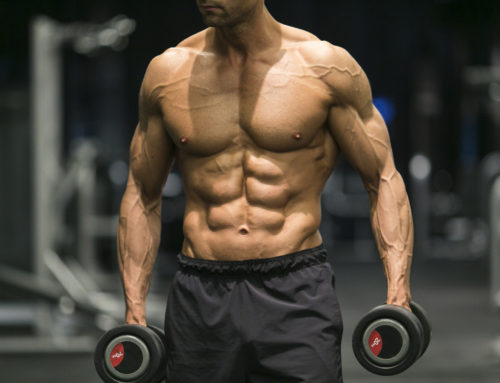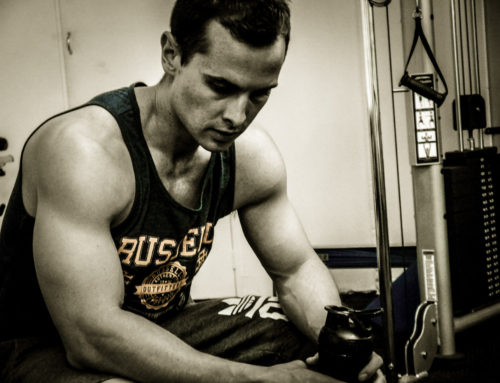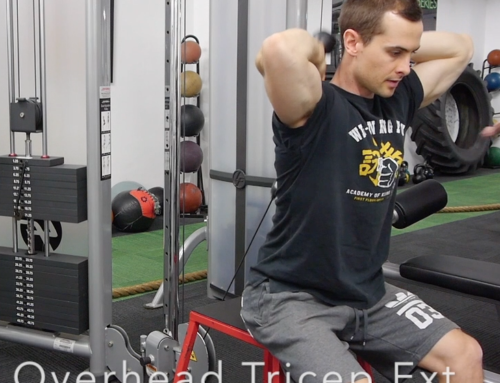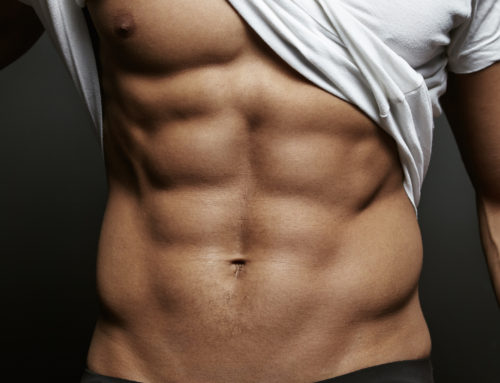A great way to ensure that you are training in the most effective way is to consider your body type.
Your body type will give you clues as to what sort of exercise you should be doing, as well as what nutrition approach will be better suited for you.
There are three main body types, known as somatotypes, which the majority of us will fit into. You may find it difficult to work out which one you fit into best, as you may be a hybrid of 2, but try and consider what represents you the most. Think about what your most natural body shape is, outside of training, your current health status, nutrition and lifestyle etc.
What were you like in your teens? What is your bone structure like? What physiques do your family have?
Somatotype breakdown
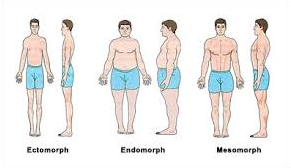
Ectomorph – Naturally thin with skinny limbs
Characteristics:
- thyroid dominant
- fast metabolic rate
- high sympathetic nervous system activity
- Higher carbohydrate tolerance
Typical Goals:
- Gain muscle, strength and size, especially in limbs
- Maintain bodyweight and strength during high volume/endurance exercise
Mesomorph – Naturally muscular and athletic
Characteristics:
- testosterone and growth hormone dominant
- moderate to high sympathetic nervous system ativity
- moderate carbohydrate tolerance
Typical Goals:
- Continue to build muscle mass while maintaining low body fat percentage
- Support athletic performance
Endomorph – Naturally broad and thick
Characteristics:
- Insulin dominant
- Slow metabolic rate
- Low sympathetic nervous system activity
- Low carbohydrate tolerance
Typical Goals:
– lose body fat, especially in central region (abdominal, lower back)
If you are still really struggling to decide what classification you fit into best, as you are a clear mix of two different somatotypes, then your best bet is to consider your goal.
Are your trying to put on muscle? Follow the ectomorph recommendations and then adjust according to the results you see.
Are you trying to increase strength/power/muscle? Follow the mesomorph recommendations and adjust according to your results.
Are you trying to drop bodyfat? Follow the endomorph recommendations and adjust according to your results.
Training and Nutrition Strategies for Ectomorph’s
Training
For this body type it is important to try and lift as much weight per session as possible. It is this very reason that the following strategies come in to play:
- Compound exercises are the superior choice
- Longer rest intervals – for example: 90s when the usual rest recommendation would be 60s. It is important for the ectomorph to not be too tired going into the next set that it causes the weight lifted to go down.
- Avoid excessive amounts of extended sets – e.g. drop sets
- Use post-exhaustion exercise techniques – e.g. Bench press followed by DB Fly’s
Ectomorphs do not perform very well with tri-sets
Opt for upper/lower splits. This means doing separate upper and lower body sessions and not doing full body sessions
Increase training age before moving to doing direct arm work
Rotate training protocol after 4-6 weeks
Minimal cardio
Avoid high intensity interval training
Nutrition
Choose nutrient dense foods
In general ectomorphs have a high carbohydrate diet and therefore their amino acid (protein) profile can suffer. The goal is to achieve 2g/kg bodyweight
Example – 70kg = 140g Protein per day
Utilize carb cycling – High carb days on training days
Typically have a very fast metabolism and good insulin management
Require high caloric intake to put on muscle
- meal replacements
- oil on salads
- butter on vegetables
- avocado
Focus on recovery by improving sleep quality
Macronutrient Starting Points (daily intake split)
Protein – 25%
Carbohydrate – 55%
Fat – 20%
Example Hypertrophy Training Routine for Chest and Back
A1. Incline Bench Press
4 x 10-12reps
Rest 90s
B1. Close Grip Chin Up
4 x 10-12reps
Rest 90s
C1. DB Bench Press
3 x 10-12reps
No rest
C2. Flat DB Fly’s
3 x 13-15reps
Rest 90s
D1. Seated Row
3 x 10-12reps
No rest
D2. 30deg Prone Rear Fly’s with Neutral Grip
3 x 13-15reps
Rest 90s
Example Nutrition Plan (70kg male)
Example Details: 70kg male that exercise 3-4 x p/wk and trying to put on muscle
Total Calories = 2,800 per day
Macronutrient Split per day
Protein = 175g
Carbohydrate = 385g
Fats = 60-65g
Daily structure if they were to exercise at lunch time
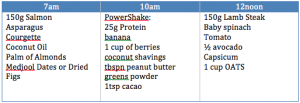

Training and Nutrition Strategies for Mesomorph’s
Training
Will respond well to multiple different training parametres
- functional hypertrophy (8-12 reps)
- hypertrophy (4-7 reps)
- relative strength (1-5 reps)
Does not respond well to strength endurance
Use a combination of both compound exercises and isolation
High intensity interval training works very well – e.g. 30s all out sprint 3-4mins recovery. Completed 4 – 6 times
Change training programme every 2-4 weeks
Be wary of overtraining, as it is very common with this body type
Include mobility drills
Be wary of injuries
Nutrition
Carb cycling will work very well
High frequency of meals – 6-8 feedings per day
Recommended supplementation
- Vit D3
- Zinc
- Magnesium
Use carbohydrates post workout
Consume moderate carbohydrate intake
Other
Consider addressing adrenals
Macronutrient Starting Points (daily intake split)
Protein – 30%
Carbohydrate – 40%
Fat – 30%
Example Hypertrophy Training Routine for Arms
A1. Decline Close Grip Bench Press
3 x 4-6reps
No rest
A2. Decline DB Tricep Ext
3 x 10-12reps
90s Rest
B1. Pronated Grip EZ Bar Preacher Curls
3 x 4-6reps
No rest
B2. Supinated Grip EZ Bar Preacher Curls
3 x 10-12reps
90s Rest
C1. Seated EZ Bar French Press
3 x 10-12reps
60s Rest
C2. Incline DB Hammer Curls (2 sec pause at stretch position)
3 x 10-12reps
60s Rest
D1. Tricep Push Down (drop sets)
3 x 8+ 2 drop sets
60s Rest
D2. Low Pulley Straight Bar Bicep Curls (drop sets)
3 x 8+ 2 drop sets
60s Rest
Example Nutrition Plan
Example Details: 80kg male that exercises 3-4 x p/wk and trying to put on muscle
Total Calories = 2,700 per day
Macronutrient Split per day
Protein = 200g
Carbohydrate = 270g
Fats = 90g
Daily Structure if he were to train at lunchtime


Training and Nutrition Strategies for Endomorph’s
Training
Start with heavy reps in the 6 – 8 rep range bracket and gradually decrease rest periods to increase density of workout, i.e. start with 2mins and drop to 60s
Session should be 45mins
Use big bang for your buck exercises, i.e. squat, deadlift, rows, presses
Perform high intensity interval training, starting with a 1:7 work to rest ratio
Rotate programme every 2 – 4 weeks
Nutrition
Low carbohydrate diet as prone to insulin resistance
No carbohydrates post workout
5 – 6 meals per day – to avoid long durations without food
Ensure toxic load is low – consider intake of pesticides, herbicides, chemicals, medications, parabens etc
Support detoxification pathways – proper intake of protein, multivitamin, B complex, selenium, chlorella, milk thistle
Other
To monitor progress with skinfolds take subcutaneous fat measurements as well as visceral fat. Do this by using calipers and then taking hip and waist circumferences.
Support adrenal glands with glandulars, adaptogens, vit C and B vitamins (specifically B5)
Use Sauna Therapy
Macronutrient Starting Points (daily intake split)
Protein – 35%
Carbohydrate – 25%
Fat – 40%
Example Training Routine for Full Body (intermediate trainee)
A1. Deadlift
4 x 6 – 8 reps
90s Rest
A2. 30deg DB Press with ¼ @ the bottom
4 x 6 – 8 reps
90s Rest
B1. BB Split Squat
3 x 8 – 10
60s Rest
B2. Lat Pull Down
3 x 8-10
60s Rest
D1. Seated Facepull
2 x 13-15reps
30s Rest
D2. Bench Reverse Crunch
2 x 13-15reps
30s Rest
Example Nutrition Plan
Example Details: 90kg male that exercise 3 x p/wk and wants to drop body fat
Total Calories = 2,200 per day
Macronutrient Split per day
Protein = 190g
Carbohydrate = 135-140g
Fats = 100g
Daily Structure if they were to exercise at lunch time


The best approach you can take is to follow the most appropriate type of training for you specifically and a great way to start is body considering your body type and then considering your goal. After implementing this strategy, monitor your progress. Are you moving in the direction of your goal? If the answer is yes, stay the course. If the answer is no, adjust accordingly. Consider the other somatotypes and see if there is anything you can take from them to positively influence your outcome.
Feel free to share with friends and please leave comments below


